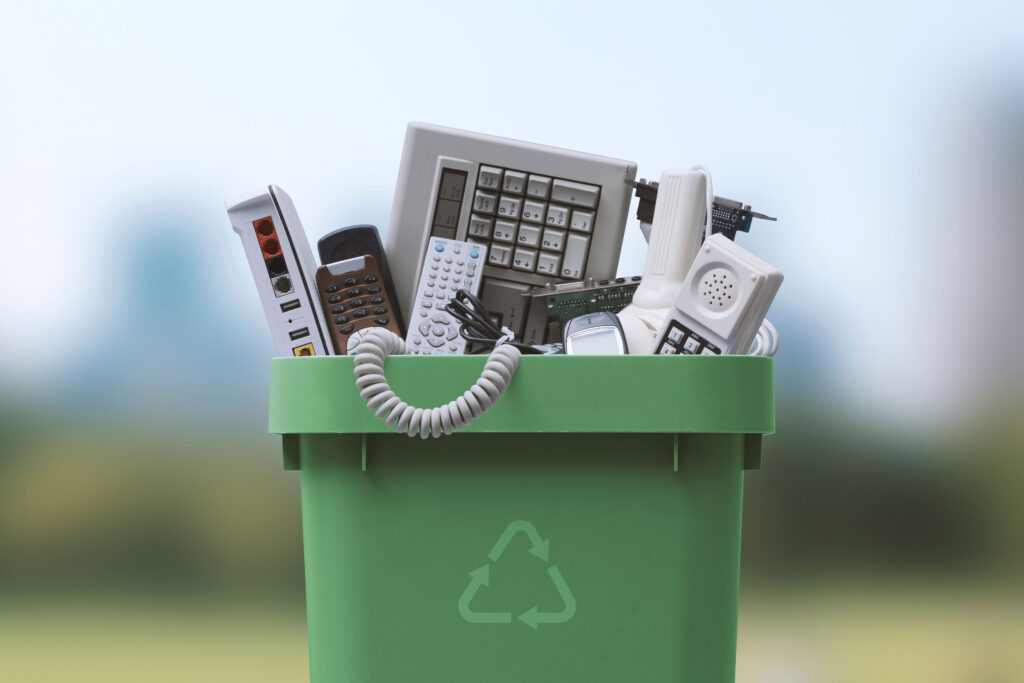
Introduction :
In today’s environmentally conscious world, businesses of all sizes increasingly recognise the importance of sustainable waste management practices. One crucial aspect is managing electronic waste.
The Environmental Impact of E-Waste :
Electronic waste comprises many discarded devices, including computers, televisions, printers, and other electronic products. When improperly discarded, these devices release hazardous substances such as lead, mercury, cadmium, and brominated flame retardants, contaminating soil, water sources, and the air we breathe. The toxic components significantly threaten human health and the environment, causing various health issues and contaminating ecosystems. By recycling e-waste, we can prevent these hazardous materials from leaching into the environment and mitigate the damage they cause.
Moreover, businesses have a legal responsibility to handle their waste responsibly. The UK government has set targets to reduce landfill waste and increase recycling rates. Failure to comply with waste management regulations can lead to fines and damage a company’s reputation. By embracing e-waste recycling, businesses can showcase their commitment to environmental sustainability and meet legal obligations.

Conserving Natural Resources:
Electronic devices contain valuable materials, including precious metals like gold, silver, palladium, and copper. When we recycle e-waste, these materials can be recovered and reused to produce new devices, reducing the need for extensive mining and extraction of finite natural resources. By adopting recycling practices, we can conserve valuable materials and minimize the environmental impact of their extraction, refining, and transportation.
Reducing Energy Consumption and Greenhouse Gas Emissions
Recycling electronic waste demands less energy compared to extracting and refining raw materials. Manufacturing products from recycled materials consumes up to 50% less energy than producing new items from virgin resources. Consequently, recycling e-waste reduces greenhouse gas emissions, helping combat climate change and its adverse effects.
Promoting Circular Economy and Sustainable Practices
Adopting a circular economy model is essential to move towards a sustainable future. Recycling e-waste aligns perfectly with this concept, as it focuses on extending the lifespan of products, reducing waste generation, and ensuring the materials’ reutilization. Recycling electronics contribute to a circular economy, reducing the pressure on natural resources and lessening the environmental burden.
Creating Green Jobs and Economic Opportunities
Recycling electronic waste creates opportunities for green jobs in the recycling industry. This sector requires a skilled workforce to dismantle, sort, and process e-waste efficiently. Governments and businesses can stimulate economic growth by investing in recycling facilities and promoting responsible e-waste management while fulfilling their environmental responsibilities.
The Role of Businesses in E-Waste Recycling
Businesses play a critical role in the generation of electronic waste. From offices with outdated computers to retail stores with returned gadgets, managing e-waste responsibly is crucial for these entities. Embracing e-waste recycling demonstrates corporate social responsibility and enhances a company’s reputation among environmentally-conscious consumers.
Moreover, recycling e-waste can lead to potential cost savings for businesses. Instead of disposing of old devices in landfills or incinerators, which may incur high waste management costs, companies can partner with certified e-waste recyclers. Many of these recyclers offer collection services, making the process convenient and hassle-free for businesses.
Furthermore, collaborating with waste management providers allows businesses to access expertise and stay up-to-date with the latest waste reduction and recycling technology advancements. This partnership encourages continuous improvement and ensures businesses remain at the forefront of sustainable practices.
Conclusion: As the leading Commercial Waste disposal business in Leicester, we firmly believe Commercial e-waste recycling and collections play a vital role in promoting environmental sustainability, complying with legal obligations, reducing costs, and contributing to a circular economy. By embracing these practices, Leicester businesses can demonstrate their commitment to a greener future while reaping financial benefits and fostering stakeholder engagement. Let us take this opportunity to make a positive impact on our environment.
Recycling electronic waste is a responsible choice and an imperative action to protect our planet from the growing environmental threats posed by improperly disposed e-waste. By embracing e-waste recycling, we can conserve natural resources, reduce energy consumption, and minimize the release of hazardous materials into the environment. Businesses, in particular, have a significant role in e-waste management to fulfil their legal obligations and promote a greener, more sustainable future. Let us join hands in taking this essential step towards environmental conservation and a better tomorrow.
All businesses are legally responsible for managing their waste in an eco-friendly manner. Failure to do so can result in fines or legal action. Proper waste disposal helps protect the environment and can save your business money in the long run.
Contact Us for Responsible Commercial Waste Management
If your business is based in Leicester Loughborough or Charnwood and needs advice on how to manage your Commercial Waste, please get in touch for a no-obligation chat HERE
Related: How you can recycle old electrical to help the environment
